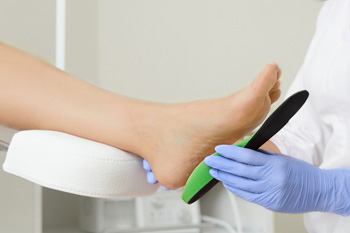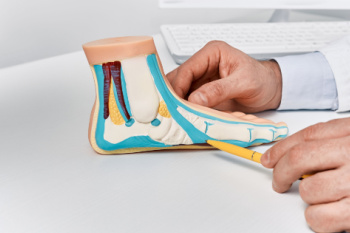Connect With Us
Blog
Items filtered by date: May 2024
The Power of Running Is Enhanced by Wearing Proper Footwear

Running offers a multitude of benefits for both physical and mental well-being. It strengthens the cardiovascular system, improves lung function, and boosts metabolism, aiding in weight management and overall health. Beyond the physical advantages, running also promotes mental clarity, stress relief, and a sense of accomplishment. However, to reap these benefits safely and effectively, investing in good running shoes is vital. Quality footwear provides essential support, cushioning, and stability, reducing the risk of injuries such as sprains, strains, and stress fractures. Proper running shoes are designed to accommodate the unique biomechanics of each individual, offering optimal shock absorption and alignment for a smoother, more comfortable stride. By selecting the right shoes for their foot type and running style, runners can enhance performance, minimize discomfort, and prolong their running journey, ensuring they can continue to enjoy the myriad benefits that running has to offer for years to come. Injuries to the foot and ankle can happen from running, and it is essential the right running shoes are chosen. It is suggested that you contact a podiatrist who can treat foot and ankle injuries, and guide you on what the best type of running shoes are right for you.
You should always make sure your running shoes fit properly in order to avoid injury. For more information, contact Vivian C. Iwu, DPM from Choice Podiatry Center. Our doctor can provide the care you need to keep you pain-free and on your feet.
Choosing the Right Running Shoe for Your Foot Type
Improper shoe sizing can cause a myriad of problems for your feet. Shoes that don’t fit you properly can lead to muscular imbalances in your body, which can result in foot, knee, and hip injuries.
Tips for Finding the Right Running Shoe
- Make sure you have a thumb’s width of wiggle room between the end of your longest toe and the front of the shoe.
- There should be little to no slipping at the heel
- Don’t assume your size in one shoe brand will be your size in another
- Do not lace up your shoes too tightly
- Walk around in the store with your new shoes before you buy them
If you have any questions please feel free to contact our our office located in Marietta, GA . We offer the newest diagnostic and treatment technologies for all your foot and ankle needs.
How Foot Biomechanics Impact Mobility
 As people age, natural changes in foot biomechanics can significantly impact mobility and overall quality of life. The feet may lose padding and elasticity in the soft tissues, which can make walking uncomfortable due to the decreased cushioning. The arches of the feet may also flatten, a condition known as adult-acquired flatfoot. Flat feet can lead to changes in gait and increased strain on the ankles, knees, and hips. Additionally, conditions like arthritis may lead joints in the feet to stiffen and become less flexible, further limiting motion and causing pain during movement. These biomechanical changes can increase the risk of falls, reduce independence, and limit activities in older adults. Podiatrists play a key role in addressing these age-related changes by suggesting targeted treatment strategies. Included are prescribing orthotic devices to support weakened arches, recommending appropriate footwear to enhance stability and cushioning, and offering exercises to strengthen foot muscles and maintain joint flexibility. Regular check-ups with a podiatrist help manage these changes effectively, ensuring better mobility and reducing the risk of injury as one ages. If you are experiencing changes in your feet and mobility, it is suggested that you make an appointment with a podiatrist.
As people age, natural changes in foot biomechanics can significantly impact mobility and overall quality of life. The feet may lose padding and elasticity in the soft tissues, which can make walking uncomfortable due to the decreased cushioning. The arches of the feet may also flatten, a condition known as adult-acquired flatfoot. Flat feet can lead to changes in gait and increased strain on the ankles, knees, and hips. Additionally, conditions like arthritis may lead joints in the feet to stiffen and become less flexible, further limiting motion and causing pain during movement. These biomechanical changes can increase the risk of falls, reduce independence, and limit activities in older adults. Podiatrists play a key role in addressing these age-related changes by suggesting targeted treatment strategies. Included are prescribing orthotic devices to support weakened arches, recommending appropriate footwear to enhance stability and cushioning, and offering exercises to strengthen foot muscles and maintain joint flexibility. Regular check-ups with a podiatrist help manage these changes effectively, ensuring better mobility and reducing the risk of injury as one ages. If you are experiencing changes in your feet and mobility, it is suggested that you make an appointment with a podiatrist.
If you have any concerns about your feet, contact Vivian C. Iwu, DPM from Choice Podiatry Center. Our doctor can provide the care you need to keep you pain-free and on your feet.
Biomechanics in Podiatry
Podiatric biomechanics is a particular sector of specialty podiatry with licensed practitioners who are trained to diagnose and treat conditions affecting the foot, ankle and lower leg. Biomechanics deals with the forces that act against the body, causing an interference with the biological structures. It focuses on the movement of the ankle, the foot and the forces that interact with them.
A History of Biomechanics
- Biomechanics dates back to the BC era in Egypt where evidence of professional foot care has been recorded.
- In 1974, biomechanics gained a higher profile from the studies of Merton Root, who claimed that by changing or controlling the forces between the ankle and the foot, corrections or conditions could be implemented to gain strength and coordination in the area.
Modern technological improvements are based on past theories and therapeutic processes that provide a better understanding of podiatric concepts for biomechanics. Computers can provide accurate information about the forces and patterns of the feet and lower legs.
Understanding biomechanics of the feet can help improve and eliminate pain, stopping further stress to the foot.
If you have any questions please feel free to contact our office located in Marietta, GA . We offer the newest diagnostic and treatment technologies for all your foot and ankle needs.
Let the Expert Treat Your Ingrown Toenails
Custom Orthotics Seasonal - Any Season

Rain or shine, snow or sleet, Custom Orthotics have your feet covered! As the seasons change, ensure your steps remain comfortable and supported. Custom Orthotics adapt to your footwear, from summer sandals to winter boots, providing consistent relief and alignment. Don't let the changing weather dictate your foot comfort. Step confidently year-round and experience the difference with Custom Orthotics. Call today for more information.
Custom Foot and Ankle Orthotics in Diabetic Foot Care Management

Custom-made foot and ankle orthotics play a vital role in diabetic foot care by addressing the unique challenges posed by this condition. Diabetes can lead to peripheral neuropathy and impaired circulation, leaving the feet vulnerable to injuries and ulcers. Left untreated, these complications can escalate, potentially resulting in severe infections, tissue damage, and possibly amputation. Orthotics designed specifically for diabetic patients offer several benefits. They help redistribute pressure away from areas prone to ulceration, thereby reducing the risk of wounds. Additionally, orthotics can improve stability and alignment, which is helpful for preventing falls and injuries. By providing cushioning and support, they also alleviate discomfort and pain associated with diabetic neuropathy. If you have diabetic foot issues, it is suggested that you schedule an appointment with a podiatrist to discuss whether orthotics can help you.
If you are having discomfort in your feet and would like to try orthotics, contact Vivian C. Iwu, DPM from Choice Podiatry Center. Our doctor can provide the care you need to keep you pain-free and on your feet.
What Are Orthotics?
Orthotics are inserts you can place into your shoes to help with a variety of foot problems such as flat feet or foot pain. Orthotics provide relief and comfort for minor foot and heel pain but can’t correct serious biomechanical problems in your feet.
Over-the-Counter Inserts
Orthotics come in a wide variety of over-the-counter inserts that are used to treat foot pain, heel pain, and minor problems. For example, arch supports can be inserted into your shoes to help correct overarched or flat feet, while gel insoles are often used because they provide comfort and relief from foot and heel pain by alleviating pressure.
Prescription Orthotics
If over-the-counter inserts don’t work for you or if you have a more severe foot concern, it is possible to have your podiatrist prescribe custom orthotics. These high-quality inserts are designed to treat problems such as abnormal motion, plantar fasciitis, and severe forms of heel pain. They can even be used to help patients suffering from diabetes by treating foot ulcers and painful calluses and are usually molded to your feet individually, which allows them to provide full support and comfort.
If you are experiencing minor to severe foot or heel pain, it’s recommended to speak with your podiatrist about the possibilities of using orthotics. A podiatrist can determine which type of orthotic is right for you and allow you to take the first steps towards being pain-free.
If you have any questions please contact our office located in Marietta, GA . We offer the newest diagnostic and treatment technologies for all your foot and ankle needs.
Myths About Custom Foot Orthotics

Custom orthotics have a rich history, but several myths persist about their function and effects on foot health. Contrary to popular belief, orthotics do not rigidly hold joints in different positions or make foot function perfect. Instead, they are designed to support the foot, providing appropriate stiffness and cushioning while allowing for natural movement. Additionally, orthotics are not one-size-fits-all. There are various methods and materials used in their fabrication to suit individual needs. Importantly, properly designed orthotics do not weaken feet over time. Instead, they help alleviate discomfort and prevent further foot deformities. Dispelling these myths highlights the true benefits of custom orthotics in promoting proper foot biomechanics and enhancing overall foot health. If you have foot issues, it is suggested that you schedule an appointment with a podiatrist to discuss whether custom-made orthotics can help you.
Experience a transformative solution to heel pain and foot pain through the personalized benefits of custom orthotics and shoe inserts. If you’re grappling with the persistent agony of plantar fasciitis, these customized inserts are designed to alleviate the strain on the plantar fascia, providing targeted relief. Engineered to adapt to your unique foot anatomy, custom orthotics tackle not only plantar fasciitis but also general foot and heel pain, offering unparalleled support and comfort. Don’t let every step be a reminder of discomfort; step into a world of tailored well-being. Say farewell to the limitations imposed by heel pain and embrace the freedom of pain-free mobility. Invest in your foot health and redefine your daily stride with the transformative power of custom orthotics and shoe inserts, ensuring each step is a step towards lasting comfort.
If you have any questions please contact our office located in Marietta, GA . We offer the newest diagnostic and treatment technologies for all your foot and ankle needs.
What Causes Flat Feet?

Flat feet, or fallen arches, are a common foot condition where the arches of the feet collapse, resulting in the entire sole of the foot making contact with the ground. Understanding the various causes, including hereditary conditions such as Ehler-Danlos syndrome and Marfan syndrome, may shed light on this condition's complexity. Genetics can influence the structure and alignment of the foot's bones, tendons, and ligaments. Individuals with a family history of flat feet are more likely to inherit the trait, predisposing them to this condition from birth. Additionally, certain medical conditions such as arthritis, obesity, and diabetes can contribute to the weakening of the foot's supportive structures, leading to flat feet over time. Furthermore, injury or trauma to the foot, prolonged standing or walking on hard surfaces, and wearing unsupportive footwear can exacerbate the condition. If you have flat feet, it is suggested that you are under the care of a podiatrist who can offer you effective relief and treatment methods.
Flatfoot is a condition many people suffer from. If you have flat feet, contact Vivian C. Iwu, DPM from Choice Podiatry Center. Our doctor will treat your foot and ankle needs.
What Are Flat Feet?
Flatfoot is a condition in which the arch of the foot is depressed and the sole of the foot is almost completely in contact with the ground. About 20-30% of the population generally has flat feet because their arches never formed during growth.
Conditions & Problems:
Having flat feet makes it difficult to run or walk because of the stress placed on the ankles.
Alignment – The general alignment of your legs can be disrupted, because the ankles move inward which can cause major discomfort.
Knees – If you have complications with your knees, flat feet can be a contributor to arthritis in that area.
Symptoms
- Pain around the heel or arch area
- Trouble standing on the tip toe
- Swelling around the inside of the ankle
- Flat look to one or both feet
- Having your shoes feel uneven when worn
Treatment
If you are experiencing pain and stress on the foot you may weaken the posterior tibial tendon, which runs around the inside of the ankle.
If you have any questions please feel free to contact our office located in Marietta, GA . We offer the newest diagnostic and treatment technologies for all your foot and ankle needs.


